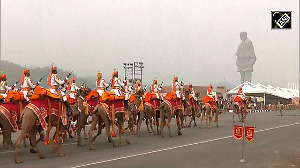 As Hong Kong shopping plazas go quiet and tourists shun Singapore and Vietnam, the financial toll from a deadly flu-like virus in Asia is rising fast.
As Hong Kong shopping plazas go quiet and tourists shun Singapore and Vietnam, the financial toll from a deadly flu-like virus in Asia is rising fast.
Big losers are Asia's airlines and travel companies. Shares in both crumbled on Monday. But other industries are starting to suffer as the illness spreads -- from taxi operators in Singapore to the shoemakers of China's rising middle class.
"There will be some earnings impact definitely around the region. Clearly airlines are getting hit because of less travel in the region. If this thing continues it will be negative for consumption stocks in china," said Tan Choon Hoe, director of investments at AIB Govett (Asia) Ltd.
"It's a question of how soon this can be resolved," he added.
Guessing the full impact of Severe Acute Respiratory Syndrome (SARS) on markets is dangerous, analysts say, as the illness grows worldwide, killing nearly 60 people and infecting more than 1,600 people since emerging in southern China in November.
In Hong Kong, where more than 620 people have been infected and 13 have died, markets are bracing for more fallout after the benchmark stock market index hit a four-and-a-half year low on Monday, led by a 7 per cent drop in the stock of the territory's flag carrier, Cathay Pacific Airways Ltd.
"First we saw aviation and hotels were hit, now the impact is gradually moving to retail stocks and will also hurt transport companies like MTR Corp Ltd and Kowloon Motor Bus Holdings Ltd," said Y K Chan, investment strategist at VC CEF Brokerage.
"There is also pressure on property developers because people do not want to visit show flats so they will put off buying."
Dining in, avoiding public spaces
Analysts said stocks like fast food outlet Cafe de Coral Holdings Ltd, and casual fashion wear retail chains Giordano International Ltd and Bossini International Holdings Ltd, are likely to feel the as people avoid the city's usually packed shops and dined at home.
Worries that potential home buyers won't queue to visit properties rattled investors of property developers such as Sun Hung Kai Properties Ltd, Henderson Land Development Co Ltd and New World Development Co Ltd, raising fears the virus will put even more pressure on an already depressed residential property market.
Dutch financial group ABN AMRO was the latest investment house on Monday to cut its 2003 economic growth forecast for Hong Kong, half a percentage point, to 3.5 per cent, assuming the virus can be brought under control within a month.
In Taiwan, where 13 people have been infected, concern has spread beyond airline and shipping shares to China plays that manufacture most of their goods on the mainland.
"Taiwan's economy is closely connected to China," said Andrew Chen, vice president of JF Asset Management in Taiwan. "SARS makes nearly all business operations a problem."
Shares in CTCI Corp, which builds petrochemical plants in China, fell 4.55 per cent on Monday after the company closed its Taipei offices for two days last week when four employees were diagnosed with SARS-like symptoms.
The company had been getting a boost on expectations that it would win Iraq-related business.
Athletic shoemaker Pou Chen, which has production facilities in the south China province of Guangdong -- a region believed to be the source of SARS -- fell seven per cent.
"Companies that are more exposed to the consumer market in China are likely to be affected," said Tan at AIB.
Singapore winces
In Singapore, where 91 people have been infected with SARS and three have died, investors sold shares in airlines and hoteliers as expectations grew that the government's official 2003 economic growth target of 2-5 per cent would be cut.
A Straits Times survey on the weekend said economists were slashing their estimates on the city-state's growth by as much as 1.8 per cent this year due to the twin impacts of the outbreak and Iraq war. Singapore's economy expanded 2.2 per cent last year.
Flag carrier Singapore Airlines Ltd has been hit hard, its shares falling 12 per cent in a week, while hotel and property owner City Developments Ltd has lost 5.8 per cent in the same period and tourism group Star Cruises Ltd has fallen 16 per cent.
Analysts said shares in new taxi company ComfortDelGro Corp would face pressure when they begin trading this week, as more Singaporeans opt to stay indoors.
In Thailand, which has been largely spared of SARS, investors were more worried about the Iraq war. "The impact should be limited as Thailand is not among countries having high risk of being infected with the virus," said Satit Wannasilpin, head of research at Capital Nomura Securities.






